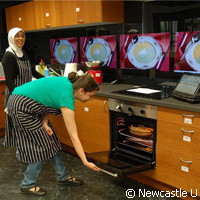Cook and learn new languages
If you ever sat at a desk with headphones on, listening to a voice dictate words and verbs in a foreign language, you're not alone. While effective, this conventional method of learning a new language can be monotonous and dreary at times. Researchers in the United Kingdom have discovered an innovative way to learn a new language: through preparing food and cooking. Developed by language experts and computer scientists at Newcastle University, a kitchen offering step-by-step cooking instructions in French could trigger a rise in language learning in the United Kingdom. A slew of recipes and real-time cooking instructions on how to prepare the succulent dishes are delivered in a way that is similar to an in-car satellite navigation (satnav) system. The researchers say motion sensor technology on kitchen equipment and ingredients keep the user on track in following the necessary steps, and ensure they have been completed according to the instructions. A laptop computer or tablet is integrated with a kitchen, and the user chooses the French recipe they plan to make. Digital sensors built into utensils, ingredient containers and other equipment then communicate with the computer to ensure the correct instructions are given at the right time, or to provide feedback to the user if a mistake has been made. The user can request for information either to be repeated or translated into English. 'This really brings foreign culture to life,' says Paul Seedhouse, professor of Educational and Applied Linguistics at Newcastle University. 'Students are able to learn aspects of the language while performing a meaningful task and experiencing the cultural aspect of learning to cook a French dish at the same time. You never really understand something properly until you do it for yourself, and one of the universal problems of classroom language teaching is that students are often rehearsing, rather than actually using the language.' The team's main objective was to make learning a new language more fun and effective. However, by associating this task with the development of another life skill, this learning process is rendered more educational as well, according to the researcher. The kitchen builds on the demonstrated technique of Task-Based Language Learning (TBLL), a teaching method where students are prompted by instructions in a foreign language to perform certain tasks. This technique has proved to be effective. However, this latest innovative scheme differs from traditional TBLL in that the task has never before been an important life skill such as cooking. Schools, universities and even people's homes are targeted as locations for these novel kitchens, which could potentially go to market in December 2012. The catering kitchen at Newcastle College in the United Kingdom was the site for the first trial of the initial version of this technology. The team has already developed a series of portable versions of the kitchen which are being taken out on roadshows to schools across the north-east of the country. The Newcastle University team is now exploring ways to commercialise this product. An EU grant of EUR 400 000 has been secured to develop Catalan, English, Finnish, German, Italian and Spanish versions. The researchers say this digital kitchen could be developed for any language and cuisine in the world. Commenting on the innovation, Professor Seedhouse from Newcastle University's School of Education, Communication and Language Sciences, who led the project with Professor Patrick Olivier of the School of Computing Science at Newcastle University, says: 'By international standards, the UK is low down on the league table when it comes to learning languages - a problem that inevitably has an economic impact. We believe that simultaneously developing skills in a country's language and its cuisine will help reverse the trend.'For more information, please visit: Newcastle University:http://www.ncl.ac.uk/Newcastle College:http://www.ncl-coll.ac.uk/
Countries
United Kingdom



